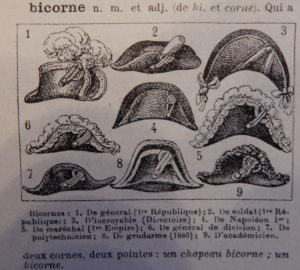(I guess the title of this post would translate as something like “Biased definition” in English; according to the OED, “tendencious” does exist, but is ascribed as coming from the German “tendenziös”)
My son is currently reading an abridged version of Les Misérables for his French class. This is a text intended for schools and comes (among other things) with explanations of “hard words”. While glancing through it recently, I noticed the following striking instance:
Le hasard, c’est-à-dire la providence(1)…
where the footnote translates, in lapidary style:
1. Providence = chance
(in English: Providence = luck). I may not know a lot about Victor Hugo, but it’s as clear as day to me that nothing could be further away from his use of the word “providence” than the idea that this is mere luck.
This reminded me of another definition I have seen in the French Larousse Universel encyclopedic dictionary from 1922 concerning the German language (see here in the middle of the page):
Langue: … une langue laborieuse… de là un certain manque de rapidité et de précision dans l’expression de la pensée.
(Or: … a clumsy language… from this comes a certain lack of speed and precision in the expression of one’s thoughts.)
This is actually a very nice book overall, with wonderfully useful illustrations to understand what, say, a “face-à-main” is, or to remind yourself of the important classification of “chapeaux bicornes”

(the scan I am linking to does not do justice to the book; one can download the PDFs of the two volumes, but each is a huge file of at least 250 MB, and the quality is also not so great — but the books become searchable).
The more common English spelling of the cognate word is “tendentious”, I think, and it means what you want it to mean.
Yes, that’s what the OED gives, but it feels slightly different to me in its shades of meaning (e.g., the last citation is from 1909, whereas according to the Grand Robert dictionary, “tendancieux” dates only to 1904, so the English word seems relatively rare and unusual, in contrast with “tendancieux” which feels very natural and common in French).
You are right that in “Le hasard, c’est-à-dire la providence”, providence certainly does not mean “mere luck” — bien au contraire.
The notion of providence in French would be something like “the unpredictable fate of things”, unpredictable because it belongs to the realm of the divine, but certainly something destined to be, and inclined to be positive as well. Where it gets tricky: to a certain extent, “chance” also conveys that idea in French…